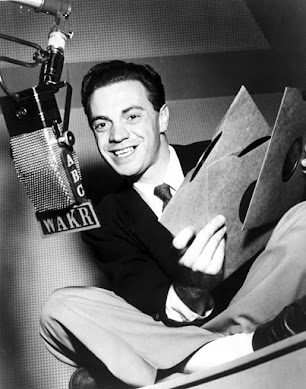If anyone can be credited with "inventing" rock & roll, it's Alan Freed. More specifically, he brought the emerging sound to a new...and predominantly white and teenaged...audience, and he also coined the name "Rock and Roll" (which was a longtime blues euphemism for...well, you can figure it out).
In the early 1950s Freed was the overnight DJ for WJW in Cleveland, spinning rhythm & blues songs in what was traditionally considered a 'dead zone' with few listeners. To the amazement of station management, however, they soon learned that Freed was drawing a much larger than usual audience for the middle of the night. His program was unique, in that at that period of time, radio stations that played "race music" tended to be small, low wattage stations focused almost exclusively in local black communities.. But WJW was a 50,000 watt juggernaut, broadcasting through multiple states in the Midwest, South, Northeast and Canada. Word of mouth about the exciting music he was playing raced through white high schools, and soon enough, countless kids were listening to their transistor radios under the covers when they were supposed to be asleep. To lessen potential backlash from white adults worried about 'negro sounds' corrupting their children, instead of accurately labeling the songs he played as rhythm & blues, Freed dubbed it rock & roll.
He was soon on the air in New York City, the seat of power at that time for virtually all of the major record labels, and from here Freed became the public voice of the rock & roll revolution. In addition to his daily radio program, he hosted a couple of TV series, and appeared in a string of low budget movies packed with musical acts...some excellent (Chuck Berry, Little Richard, LaVern Baker), some not so much (Ivy Schulman & the Bowties, anyone?).
By all accounts, Freed wasn't a bad guy...but he was no saint, either. Like many other DJs, he indulged liberally in payola...accepting bribes to play certain songs on the air. He also wheedled his name into the writing credits of a number of tunes (the best remembered being Chuck Berry's "Maybellene") without having contributed so much as a comma to the lyrics. He could also be arrogant, which wasn't helped by the fact that as he grew more famous, he sank further and further into alcoholism.
It all came crashing down on him by the late Fifties, when Congress opened investigations into payola in the recording industry, and Freed's role was publicly exposed. His station, WINS, had been looking for a reason to get rid of him, and this was it. Despite his still-strong ratings, Freed had simply become too difficult to work with. Plus, the era of the independent DJ picking his own music to play was ending, as program directors took control of playlists, creating the 'Top 40', in which a relative handful of songs were played repeatedly throughout the day. Freed refused to give up his right to play whatever the hell he wished, and so he had to go.
Blackballed from the major markets, he bounced around through several small radio stations across the country, his name already fading from memory as a new wave of teens got their exposure to rock & roll from the Top 40, which by the early 60s was dominated by acts that had been scrubbed lily white (I'm looking at you, Paul and Paula), and were a quantum leap from the sexually charged and oh, so dangerous R&B-steeped rockers that Freed had brought to the masses over the airwaves. By 1965, his organs ravaged by alcohol, Freed died.



No comments:
Post a Comment